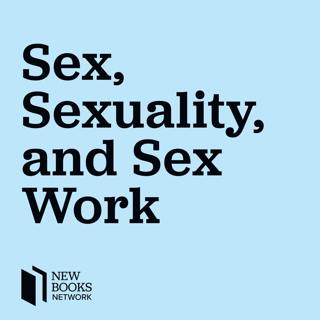
Averill Earls, "Love in the Lav: A Social Biography of Same-Sex Desire in Ireland, 1922-1972" (Temple UP, 2025)
Averill Earls is an associate professor in history at St. Olaf’s College and her research focuses on sexuality and modern Ireland. Her writing has appeared in the Journal of the History of Sexuality, Historical Reflections (in the top-visited issue of the journal to date), Perspectives Magazine, Nursing Clio, and Notches Blog. In 2021 she was awarded the Judith R. Walkowitz Article Prize for her 2020 article, "Solicitor Brown and His Boy." Prof. Earls is also one of the four feminist historians and award-winning podcasters who founded Dig: A History Podcast in 2017. Love in the Lav: A Social Biography of Same-Sex Desire in Ireland, 1922-1972 (Temple UP, 2025) tells the unexpected, sometimes heartbreaking, stories of Dublin’s men who desired men and the Gardaí who policed them. The book uncovers Ireland’s queer lives of the past. Averill Earls investigates how same-sex-desiring men lived and loved in a country where their sexuality was illegal and seen as unnatural. Across seven social biographical chapters, each highlighting individuals at the nexus of these histories, Earls constructs a narrative of experiences through the larger contexts in which they are embedded. She uses courtroom testimonies, police records, and family history archives as well as “educated speculation” to show how structures governing male same-sex desire in Ireland played out on the bodies of the men who desired men, the teen boys who sold sex to men, and the way the Catholic-nationalist ethos shaped the Gardaí who policed them. Love in the Lav examines the experiences of people such as cabbie James Hand, who was put on trial for gross indecency, to provide a window into the queer working-class subculture of 1930s Dublin. Earls also focuses on issues of consent, especially with teens, and the unregulated queer Irish world of public figures, including Micheál Mac Liammóir, Hilton Edwards, Ronald Brown, and John Broderick. By examining twentieth-century Ireland through the lived experiences of ordinary same-sex-desiring Irish men who were relegated to obscurity by Irish society, Earls reveals the contradictions, possibilities, and magnitude of postcolonial Irish Catholic nationalism. Learn more about your ad choices. Visit megaphone.fm/adchoices
10 Syys 33min

Sexual Imperialism and English Language Teaching
In this episode of the Language on the Move Podcast, Dr Hanna Torsh speaks with Dr Vaughan Rapatahana about sexual predation in the English language teaching industry. The conversation addresses his new book Sexual Predation and TEFL: The teaching of English as a Foreign Language Enables Sexual Predation (Brill, 2024), which explores how teaching English overseas intersects with and enables widespread sexual exploitation. Trigger warning: this show discusses sexual exploitation and related content that listeners may find distressing. For additional resources, show notes, and transcripts, go here. Learn more about your ad choices. Visit megaphone.fm/adchoices
2 Syys 31min

Patrice D. Douglass, "Engendering Blackness: Slavery and the Ontology of Sexual Violence" (Stanford UP, 2025)
In Engendering Blackness: Slavery and the Ontology of Sexual Violence (Stanford UP, 2025) Patrice D. Douglass interrogates the relationship between sexual violence and modern racial slavery and finds it not only inseverable but also fundamental to the structural predicaments facing Blackness in the present. Douglass contends that the sexual violability of slaves is often misappropriated by frameworks on sexual violence that privilege its occurrences as a question of ethics, sexual agency, and feminine orders of gendering. Rather, this book foregrounds Blackness as engendered by sexual violence, which forcefully (re)produces Blackness, corporeally and conceptually, as a condition that lacks the capacity to ontologically distinguish its suffering from what it means to be human. By employing and critically revising Black feminist theory and Afro-pessimism, Douglass reveals that engaging primarily with the sexualization of the slave forces theories of sexual violence to interrogate why this violence—one of the most prevalent under slavery—continues to lack a grammar of fundamental redress. There are no reparations struggles for the generational transfer of sexual violation and the inability of present frameworks to rectify the sexual stains of slavery lies precisely in the fact that what made this history possible continues to haunt arrangements of life today. Engendering Blackness urgently articulates the way our present understandings of Blackness and humanness are bound by this vexed sexual history. Learn more about your ad choices. Visit megaphone.fm/adchoices
29 Elo 1h 19min

Marla Segol, "Kabbalah and Sex Magic: A Mythical-Ritual Genealogy" (Pennsylvania State UP, 2022)
In Kabbalah and Sex Magic: A Mythical-Ritual Genealogy (Penn State University Press, 2021) a provocative book, Marla Segol explores the development of the kabbalistic cosmology underlying Western sex magic. Drawing extensively on Jewish myth and ritual, Segol tells the powerful story of the relationship between the divine and the human body in late antique Jewish esotericism, in medieval kabbalah, and in New Age ritual practice. Kabbalah and Sex Magic traces the evolution of a Hebrew microcosm that models the powerful interaction of human and divine bodies at the heart of both kabbalah and some forms of Western sex magic. Focusing on Jewish esoteric and medical sources from the fifth to the twelfth century from Byzantium, Persia, Iberia, and southern France, Segol argues that in its fully developed medieval form, kabbalah operated by ritualizing a mythos of divine creation by means of sexual reproduction. She situates in cultural and historical context the emergence of Jewish cosmological models for conceptualizing both human and divine bodies and the interactions between them, arguing that all these sources position the body and its senses as the locus of culture and the means of reproducing it. Segol explores the rituals acting on these models, attending especially to their inherent erotic power, and ties these to contemporary Western sex magic, showing that such rituals have a continuing life. Asking questions about its cosmology, myths, and rituals, Segol poses even larger questions about the history of kabbalah, the changing conceptions of the human relation to the divine, and even the nature of religious innovation itself. This groundbreaking book will appeal to students and scholars of Jewish studies, religion, sexuality, and magic. Jana Byars is the Academic Director of Netherlands: International Perspectives on Sexuality and Gender. Learn more about your ad choices. Visit megaphone.fm/adchoices
17 Elo 56min

Marla Segol, "Kabbalah and Sex Magic: A Mythical-Ritual Genealogy" (Pennsylvania State UP, 2022)
In Kabbalah and Sex Magic: A Mythical-Ritual Genealogy (Penn State University Press, 2021) a provocative book, Marla Segol explores the development of the kabbalistic cosmology underlying Western sex magic. Drawing extensively on Jewish myth and ritual, Segol tells the powerful story of the relationship between the divine and the human body in late antique Jewish esotericism, in medieval kabbalah, and in New Age ritual practice. Kabbalah and Sex Magic traces the evolution of a Hebrew microcosm that models the powerful interaction of human and divine bodies at the heart of both kabbalah and some forms of Western sex magic. Focusing on Jewish esoteric and medical sources from the fifth to the twelfth century from Byzantium, Persia, Iberia, and southern France, Segol argues that in its fully developed medieval form, kabbalah operated by ritualizing a mythos of divine creation by means of sexual reproduction. She situates in cultural and historical context the emergence of Jewish cosmological models for conceptualizing both human and divine bodies and the interactions between them, arguing that all these sources position the body and its senses as the locus of culture and the means of reproducing it. Segol explores the rituals acting on these models, attending especially to their inherent erotic power, and ties these to contemporary Western sex magic, showing that such rituals have a continuing life. Asking questions about its cosmology, myths, and rituals, Segol poses even larger questions about the history of kabbalah, the changing conceptions of the human relation to the divine, and even the nature of religious innovation itself. This groundbreaking book will appeal to students and scholars of Jewish studies, religion, sexuality, and magic. Jana Byars is the Academic Director of Netherlands: International Perspectives on Sexuality and Gender. Learn more about your ad choices. Visit megaphone.fm/adchoices
17 Elo 56min

Ayo Wahlberg, "Good Quality: The Routinization of Sperm Banking in China" (U California Press, 2018)
From its crude and uneasy beginnings thirty years ago, Chinese sperm banking has become a routine part of China’s pervasive and restrictive reproductive complex. Today, there are sperm banks in each of China’s twenty-two provinces, the biggest of which screen some three thousand to four thousand potential donors each year. Given the estimated one to two million azoospermic men--those who are unable to produce their own sperm--the demand remains insatiable. China’s twenty-two sperm banks cannot keep up, spurring sperm bank directors to publicly lament chronic shortages and even warn of a national ‘sperm crisis’ (jingzi weiji). Ayo Wahlberg book Good Quality: The Routinization of Sperm Banking in China (U California Press, 2018) explores the issues behind the crisis, including declining sperm quality in the country due to environmental pollution, as well as a chronic national shortage of donors. In doing so, Wahlberg outlines the specific style of Chinese sperm banking that has emerged, shaped by the particular cultural, juridical, economic and social configurations that make up China’s restrictive reproductive complex. Good Quality shows how this high-throughput style shapes the ways in which men experience donation and how sperm is made available to couples who can afford it. Victoria Oana Lupascu is a PhD candidate in dual-title doctoral program in Comparative Literature and Asian Studies at the Pennsylvania State University. Her areas of interest include 20th and 21st Chinese literature and visual art, medical humanities and Global South studies. Learn more about your ad choices. Visit megaphone.fm/adchoices
8 Elo 1h 12min

Hannah Charnock, "Teenage intimacies: Young Women, Sex and Social Life in England, 1950-80" (Manchester UP, 2025)
Teenage Intimacies offers a new account of the ‘sexual revolution’ in mid-twentieth century England. Rather than focusing on ‘Swinging London’, the book reveals the transformations in social life that took place in school playgrounds, local cinemas, and suburban bedrooms. Based on over 300 personal testimonies, Teenage Intimacies traces the everyday experiences of teenage girls, illuminating how romance, sex and intimacy shaped their young lives. The book shows how sex became embedded in ideas about ‘growing up’ and explores how heterosexuality influenced young women’s social lives and vice versa. It offers new explanations of why sexual mores shifted in this period, revealing the pivotal role that young women played in changing sexual values, cultures and practices in the 1950s, 1960s and 1970s. Learn more about your ad choices. Visit megaphone.fm/adchoices
2 Elo 41min

Chris Washington, "Nonbinary Jane Austen" (U Minnesota Press, 2025)
In Nonbinary Jane Austen, Chris Washington theorizes how Jane Austen envisions a nonbinary future that traverses the two-sex model of gender that we can supposedly see solidifying in the eighteenth century. Arguing that her writing works to abolish gender exclusivity altogether, Washington shows how she establishes a politics that ushers in a future built on plurality and possibility. Chris Washington is associate professor of English at Francis Marion University in South Carolina, USA. Washington is the editor of a recent Norton Critical Edition of Mary Shelley’s The Last Man and is the author of Nonbinary Jane Austen, Romantic Revelations: Visions of Post-Apocalyptic Hope and Life in the Anthropocene (University of Toronto Press, 2019), and essays on the literature of the Romantic period and on contemporary theory and philosophy. Tristan Burke researches and teaches eighteenth and nineteenth-century literature and continental philosophy. He is the author of Byronism, Napoleonism, and Nineteenth-Century Realism: Heroes of Their Own Lives? (Routledge, 2022) Learn more about your ad choices. Visit megaphone.fm/adchoices
2 Elo 1h 9min




















